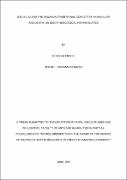| dc.description.abstract | The study focused on the ideo-theological hermeneutics of Job 14:1-12 in relation to the
Baganda’s traditional concept of human life and death. The study sought to discuss the text in
relation to the Baganda’s traditional concept of human life and establish the ideo-theological
and cultural correspondences between the text and the Baganda conceptualization of human
life and death (Okufa). The theoretical frame work of the study was African Postcolonial Bible
Hermeneutics, specifically Hermeneutics of Appropriation. The study carried out a detailed
examination of Job 14:1-12 in its context where the background, description and analysis of
the text were made, drawing out the theme of human life and death. The study further
investigated the theme of human life in relation to death in the Biblical world and the Ancient
Near Eastern civilizations of Egypt and Mesopotamia. Concerning the Baganda concept of
death, the study entails death management rituals and their symbolism and significance to
human life, and how the Baganda embody and polemicize death. The study reveals that though
Job presents his lament as the universal fate of all mankind, his idea of human life is influenced
by the situation circumstances in which he finds himself. His reality of death is nihility. Amidst
the reality of losing all his children, he has no hope of having more given his imminent death.
Job focuses much on the physical death and offers less attention to the netherworld. Put in the
Baganda context, Job expected to suffer a bad death, the death of all his children rendered him
childless and just like an African—the Muganda in that regard, the childless Job and his
imminent physical death implied the death of his name, his memory and combustibility of his
legacy and existence. Though Job’s idea of life after death as commonly known in the Bible
and African cultures is not clear in his laments, the Biblical and African cultural understanding
of death is that death is a gateway to another world of spiritual existence. Nevertheless, Job’s
idea in the texts is the reality shared by Africans in context of a person who has suffered a bad
death often associated with childlessness and other social vices. | en_US |

